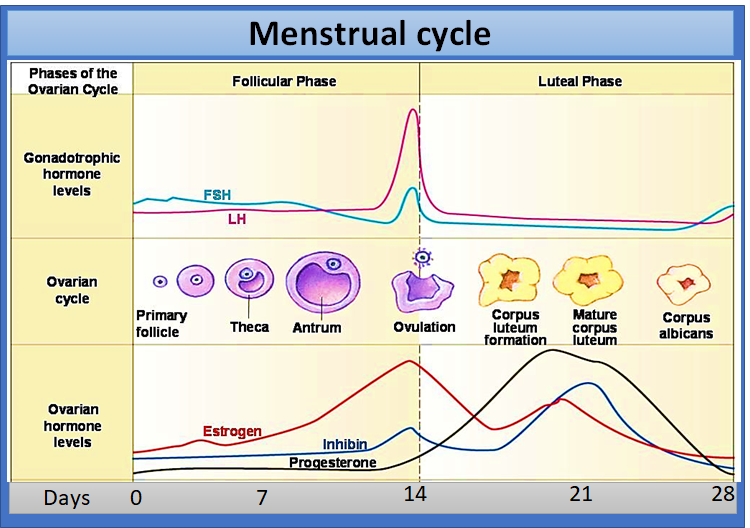
Ovulation occurs under the influence of
(a) Progesterone
(b) Estrogens
(c) FSH
(d) LH
Answer
572.4k+ views
Hint: This hormone is secreted by the gonadotropic cells in the anterior pituitary gland. An acute rise of this hormone triggers ovulation and development of the corpus luteum in females.
Complete answer:
The ovulation process occurs under the influence of LH known as the luteinizing hormone which is secreted by the gonadotropic cells in the anterior pituitary gland. The process of release of a mature egg from the ovary is known as ovulation.
Additional information:
- In humans, ovulation occurs about midway through the menstrual cycle after the follicular phase that means on the 14th day of a 28-day cycle. This takes place under the influence of follicle-stimulating hormone.

- The luteinizing hormone is released by the pituitary gland into the bloodstream and is one of the gonadotropic hormones.
- The luteinizing hormone is responsible to stimulate the growth of ovarian follicles in the ovary before the release of an egg from one follicle at ovulation, in women.
- This hormone also stimulates a number of follicles to develop and start the production of the estrogen hormone.
- The secretion of luteinizing hormone increases rapidly just before ovulation occurs which is called LH surge under the influence of estrogen.
- During the luteal phase of the menstrual cycle, the corpus luteum develops from an ovarian follicle just after the release of a secondary oocyte from the follicle during ovulation.
- The LH hormone is responsible to stimulate the formation of the corpus luteum and LH is also very much necessary to maintain the luteal function for the second two weeks of the menstrual cycle.
So, the correct answer is, ’(d) LH’.
Note:
- A baby girl born with 1 to 2 million immature eggs in her ovaries called oocytes and Usually, she releases just one each month.
- Ovulation process happens around the 11th–14th days of a woman's menstrual cycle, about two weeks just before the menstruation begins.
- The ovulation occurs only one time during each menstrual cycle and generally lasts from 12- 24 hours.
Complete answer:
The ovulation process occurs under the influence of LH known as the luteinizing hormone which is secreted by the gonadotropic cells in the anterior pituitary gland. The process of release of a mature egg from the ovary is known as ovulation.
Additional information:
- In humans, ovulation occurs about midway through the menstrual cycle after the follicular phase that means on the 14th day of a 28-day cycle. This takes place under the influence of follicle-stimulating hormone.

- The luteinizing hormone is released by the pituitary gland into the bloodstream and is one of the gonadotropic hormones.
- The luteinizing hormone is responsible to stimulate the growth of ovarian follicles in the ovary before the release of an egg from one follicle at ovulation, in women.
- This hormone also stimulates a number of follicles to develop and start the production of the estrogen hormone.
- The secretion of luteinizing hormone increases rapidly just before ovulation occurs which is called LH surge under the influence of estrogen.
- During the luteal phase of the menstrual cycle, the corpus luteum develops from an ovarian follicle just after the release of a secondary oocyte from the follicle during ovulation.
- The LH hormone is responsible to stimulate the formation of the corpus luteum and LH is also very much necessary to maintain the luteal function for the second two weeks of the menstrual cycle.
So, the correct answer is, ’(d) LH’.
Note:
- A baby girl born with 1 to 2 million immature eggs in her ovaries called oocytes and Usually, she releases just one each month.
- Ovulation process happens around the 11th–14th days of a woman's menstrual cycle, about two weeks just before the menstruation begins.
- The ovulation occurs only one time during each menstrual cycle and generally lasts from 12- 24 hours.
Recently Updated Pages
Master Class 11 Business Studies: Engaging Questions & Answers for Success

Master Class 11 Computer Science: Engaging Questions & Answers for Success

Master Class 11 Economics: Engaging Questions & Answers for Success

Master Class 11 Social Science: Engaging Questions & Answers for Success

Master Class 11 English: Engaging Questions & Answers for Success

Master Class 11 Chemistry: Engaging Questions & Answers for Success

Trending doubts
Draw a diagram of nephron and explain its structur class 11 biology CBSE

Explain zero factorial class 11 maths CBSE

Chemical formula of Bleaching powder is A Ca2OCl2 B class 11 chemistry CBSE

Name the part of the brain responsible for the precision class 11 biology CBSE

The growth of tendril in pea plants is due to AEffect class 11 biology CBSE

One Metric ton is equal to kg A 10000 B 1000 C 100 class 11 physics CBSE




